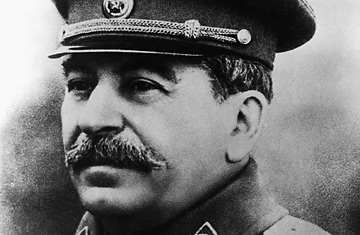
Joseph Stalin
The more successful a russian leader becomes, the more insecure he feels. When Emperor Alexander I had taken Napoleonic Paris and when Marshal Stalin had conquered Hitlerite Berlin, they were the arbiters of Europe, yet both had to resist strong tides of liberal expectation not so much from their people as from their élite grandees. In Russian politics, it is not the ordinary people who matter most of the time. The ruler truly fears the dangerous, treacherous and greedy clique closest to him. Russian leaders are most often removed in palace coups; even the tsarist system was once described as an "autocracy tempered by assassination." Peter III and Paul I were murdered by those closest to them; Lavrenti Beria, the strongman for three months after Stalin's death, was arrested and then executed; when Nikita Khrushchev was overthrown in 1964, some key plotters close to Leonid Brezhnev discussed having him killed; and a failed 1991 coup by security bosses undermined Mikhail Gorbachev. That is why Tsar Ivan the Terrible, Peter the Great and Stalin turned on their élites, killing many and trying to create new inner circles of their own.
Putin is subtler than that. We may never know all the details of what is happening behind the scenes today, but it is clear that Putin is deftly managing the struggle for power and spoils among the factions that swirl around him. Throughout Russian history, the ruler has never been able to simply leave power, for fear of exposing himself and his henchmen to vengeance from their rivals. Thus, even at his most powerful, Putin could not afford to walk away, even if he really wanted to.
Putin has worked hard to emasculate the Duma, press and opposition, but in a sense this makes him more vulnerable because his system is so rigid that only something like the Rose Revolution in Georgia or the Orange one in Ukraine could destroy it. This explains his cultivation of xenophobic paranoia and use of clumsy repression even when he is so popular, they hardly seem necessary. Another reason for this vulnerability is that his success is based on oil: prices could fall one day and leave him an emperor with no clothes.
When he steps down as President, he has said he will become Prime Minister. He will probably keep overseeing the "power ministries"—defense, security and foreign affairs—by controlling his puppet President and protégé, Dmitri Medvedev. But this is a dangerous maneuver: What if the puppet turns on his master, as Putin turned on the Yeltsin "Family" of billionaires and bureaucrats who created him? Putin's cult of personality is his best protection: it is a shield that gives an invulnerable prestige that would be hard for an understudy like Medvedev to ignore, even if he planned a creeping palace coup.
Putin is a unique combination of styles: he projects the sumptuous majesty of the Tsars and the distant power of the Soviet General Secretaries, combined with a nationalist populism. When he allowed himself to be photographed shirtless on a fishing trip, he could have been channeling Peter the Great, who projected a virile style by posing as an ordinary sailor, or Catherine the Great's favorite, Prince Potemkin, who wore a caftan without trousers to receive ambassadors.
Putin started his presidency projecting himself as absolutist but liberal along the lines of Catherine. These days he presents himself as a tough, nationalistic authoritarian. He is not a Stalinist or a Marxist; Russia's "sovereign democracy" is much freer than Soviet rule, and there is no mass terror, but he has made the security organs as powerful as they were in the 1920s through the 1950s or during the 15-month-long reign of the ailing former KGB boss and Soviet leader Yuri Andropov. This should be no surprise: the Soviet secret police was never designed as a discrete institution—it was the backbone of state power, the knighthood of the revolution, qualified to protect and purify Russia.
History lives in Russia. Stalin was obsessed with history and based part of his style on the brutal Ivan the Terrible and Peter the Great. "The Russian people need tsardom," Stalin said. When he walked around the Kremlin, he reflected, "Ivan once walked here." Now Stalin has become the best barometer of Russian leadership style. New state textbooks hail Stalin as "the most successful Russian leader ever" and a state builder along the lines of Peter the Great and Bismarck.
Putin has one unexpected connection to the past: his grandfather was a chef who cooked for Rasputin, Lenin and Stalin. Half of Stalin's huge library, with marginal notes in his red crayon, remains in Putin's office, and when he is bored, it is said, he takes down a book and discusses the notes with his visitors. Ironically, Stalin the Marxist—born a Georgian cobbler's son—has become the icon and prototype of the strong Russian Tsar, the hero of a resurgent, capitalist Russia.
Montefiore is the author of Young Stalin and Catherine the Great and Potemkin